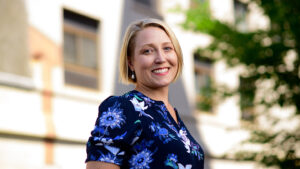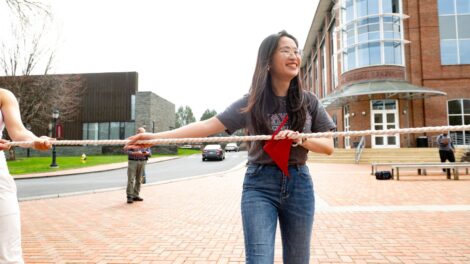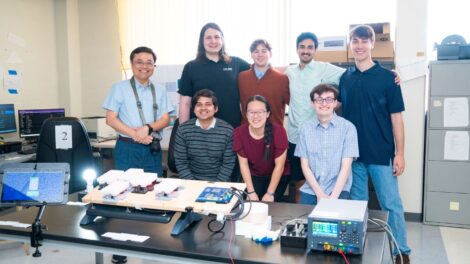Lafayette joins pilot program to develop teaching certification for engineering faculty
By Bryan Hay
Lafayette College is part of a national task force that is working to develop a national certification program for recognizing and promoting high-quality teaching by faculty in engineering and engineering technology (EET).
Led by the American Society for Engineering Education (ASEE) and supported by a three-year National Science Foundation grant, the task force seeks to create training resources to support ongoing professional development of EET faculty. Many of them emerge from their five years of graduate training armed with the latest techniques and research methodologies, but enter the classroom without formal training on how to teach.
“Doctoral students in STEM fields, especially in engineering, aren’t ever formally trained for teaching,” says Lauren Anderson ’04, professor of chemical and biomolecular engineering and Williams Jeffers Dean of Engineering, who represents Lafayette among the eight colleges piloting this professional development initiative.
“We come to this profession, and we learn on the job,” she says. “ASEE is in a unique position to do something about that and support new faculty in their development as both teachers and scholars.”

Lauren Anderson ’04, professor of chemical and biomolecular engineering and Williams Jeffers Dean of Engineering
As part of the pilot group, Lafayette will have between five and 10 faculty members directly involved in the development of a faculty recognition system for teaching excellence. They will be asked to put together a portfolio to demonstrate competencies and core areas as defined and reviewed by the task force.
The goal is that faculty who apply for and complete the training will receive a certificate affirming they have met the registered engineering educator level, which they can use for their tenure processes at their own institutions or use in the job market to demonstrate their commitment to teaching.
“Right now, peer-reviewed publications are the currency to demonstrate that you’re an active scholar in STEM fields,” Anderson notes. “How many publications do you have? What types of journals are you publishing in? But there’s really not that same kind of credentialing or certification for teaching.”
Lafayette is fortunate to routinely attract faculty who are committed to teaching and are interested in learning new pedagogical approaches, Anderson says, which is why she wanted to be part of this ASEE pilot program.
“We have a lot to offer—experienced, nationally recognized faculty, a robust slate of programs already offered by the Center for the Integration of Teaching, Learning, and Scholarship and the Hanson Center for Inclusive STEM Education, one of only two in the country,” she says.
“We provide so many touch points with the topics and methods the task force is trying to develop, such as in course design, inclusive classrooms, and assessment methods,” says Anderson, expressing hope that Lafayette teaching certification can ultimately be credentialed and attained on campus, instead of requiring time away to attend expensive workshops and training sessions.
Connecting Lafayette with the task force and ASEE will allow us to share things we are doing, learn from other institutions, and ultimately build a network to improve teaching nationally, she notes.
“We’re always working on improving our teaching at Lafayette, so developing such a framework is a nice way to recognize, celebrate, and value the time that faculty spend to improve their teaching,” Anderson says.
Faculty continuously revise their courses, and often those efforts are not seen until the time of tenure or promotion.
“This could be a way, through a national certification program, to support faculty and encourage ongoing personal and professional development,” Anderson says.
“Participating in the project is a great way to share more about Lafayette with the rest of the partner institutions,” she adds. “We have faculty committed to teaching excellence and nationally ranked engineering programs. I appreciate the opportunity for Lafayette to be part of this national effort.”

